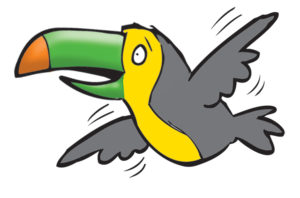Children thrive when their strengths are valued. Often, the weight of a ‘problem’ can lift considerably when we think of it as a strength yet to be developed. For these reasons many family counsellors, welfare coordinators and support workers encourage parents and carers to reflect on the importance of noticing children’s strengths. Questions to explore include:
- What are the child’s strengths?

- What difference might it make if I name them?
- Am I in the habit of celebrating the strengths of the children around me?
- How do the child’s strengths make a positive difference to us all?
- Do I celebrate my own strengths?
Strengths: Past, Present and Future
Try using Strengths Cards for Kids. Begin by spreading the cards out. Invite people to pick cards using questions such as:
- When you were a child, what strengths do you think you had?
- Who noticed these strengths in you? Did you have strengths that others didn’t see?
- What strengths did your parents/teachers/siblings think you had?
- Are these strengths important to you now?
- Which strengths have you built on over time? How did that happen?
- Think of someone you admire. What strengths do you see in them?
- Which strengths do you want to role model for your own children?
- Think of someone else in your family or team. What strengths do you see in them?
Random Selection for Adults
There are endless creative ways to create random choice. For example, you can spread the cards out face down and people can simply choose cards at random; someone can shuffle the deck of cards and deal one or more cards to each person; or the cards can be placed in a bag or basket to create a ‘lucky dip’; or a card can be placed on each person’s seat before they enter the room. Questions like the following can then be asked:
- What do these strengths mean to you?
- What other words could describe these strengths?

- How do these cards relate to your life at present?
- How significant do you think these strengths are?
- Do they relate to each other in any way?
- Can you think of situations where you have used these strengths recently?
- Do you know someone who is particularly good at these strengths?
Strengths Sitting Behind Difficulties
When the going gets tough with a child’s behaviour, it can be easy to lose touch with the strengths of that child. Especially during challenging times, parents (and teachers) may end up seeing only the problem.
They may forget the person that the child is and the strengths that they have. Questions such as the following can be useful:
- What was your child like when they were younger? Pick 2 cards for strengths you saw in them then. Can you share some examples of how they showed this strength?
- Think about good times you have had as a family in the past. Pick a strength for every family member and talk about what you see in them.
- Think of a child in your life whose behaviour you find difficult (if you are a teacher the child may be in your class). Pick a card for a strength that may sit behind that behaviour. Does this change how you see the behaviour, or will react to it?
- How might you acknowledge this strength openly with them and help them to express that strength in other ways?
When the Boat Tips Over
Sometimes there is a point at which things get out of balance and a strength tips over into a difficulty. For example, tidiness may be a wonderful strength, but it can also tip over into obsessiveness or rigid control. Questions such as the following can be useful for reflecting on change, discussing challenging behaviour and developing interpersonal skills:
- Do any of your strengths ever get you into trouble?
 Have you ever felt that you have lost touch with a strength you used to have?
Have you ever felt that you have lost touch with a strength you used to have?- Do you use some strengths more than others?
- Has anyone ever criticised a strength of yours? Were their comments useful?
- Are there other strengths that could help you keep a strength from going overboard?
- How might you bring balance when you think one of your strengths is dominating too much?
- Do you sometimes feel you have lost strengths you used to have? Have they really gone?
- How might you bring them out again?
Who Can Find the Toucan? You Can!
Can you find the toucan in every card? The toucan observes the action from the sidelines or from the air or even from the other side of the window. The toucan’s expressions and behaviour are responsive to what is happening in each picture. The toucan is an ‘observer character’—a witness—and he or she has an important job. The toucan watches what is going on and represents an extra voice or alternative viewpoint that can be brought into the conversation. It is a voice that has a more detached perspective than the characters participating directly in the scene. You can ask:
- What is the toucan thinking?
- What is the toucan noticing?
- What would the toucan say is happening in the situation?

- What would the toucan want you to notice?
- What would the toucan say you should do?
- If you were the toucan, what would you say to all the other animals in the scene?
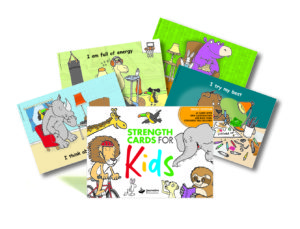 From the booklet accompanying ‘Strengths Cards for Kids‘
From the booklet accompanying ‘Strengths Cards for Kids‘

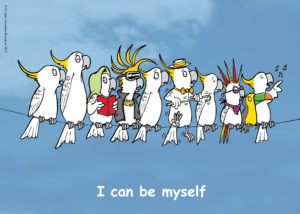
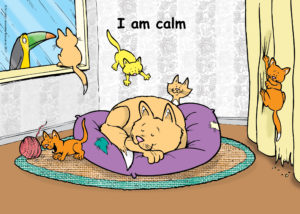
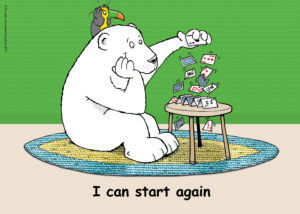 Have you ever felt that you have lost touch with a strength you used to have?
Have you ever felt that you have lost touch with a strength you used to have?